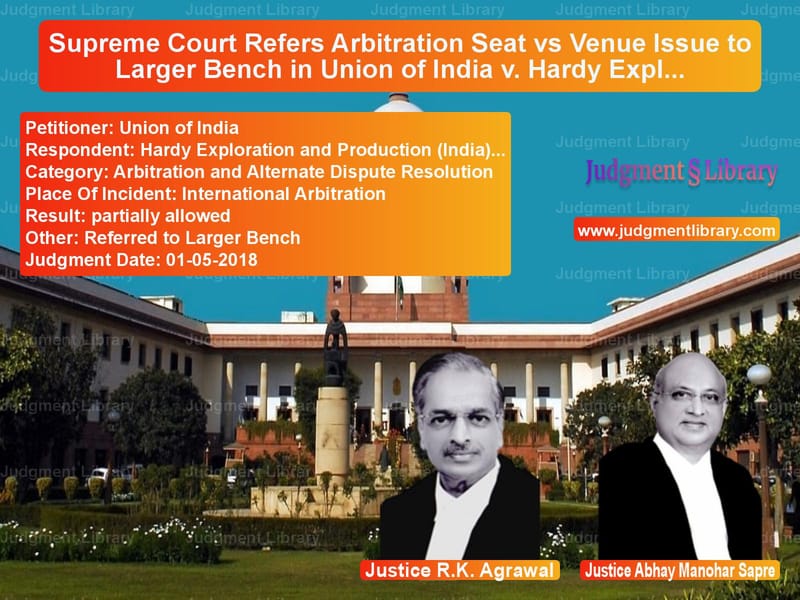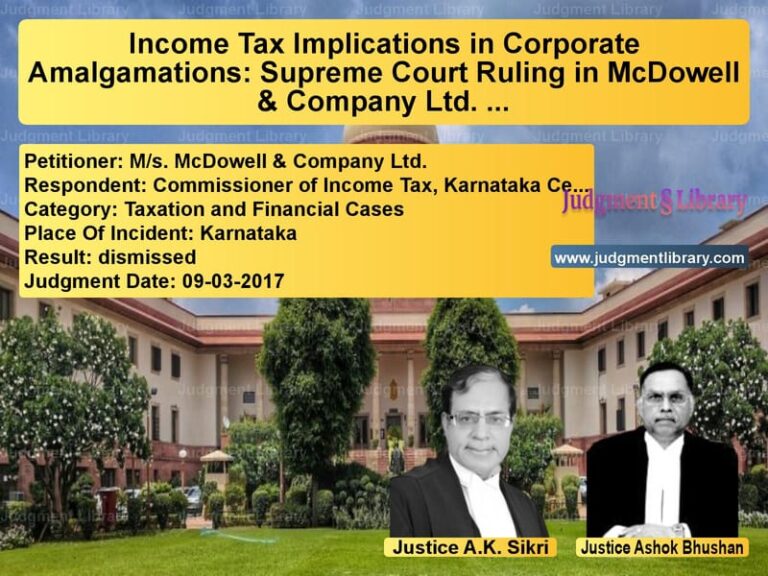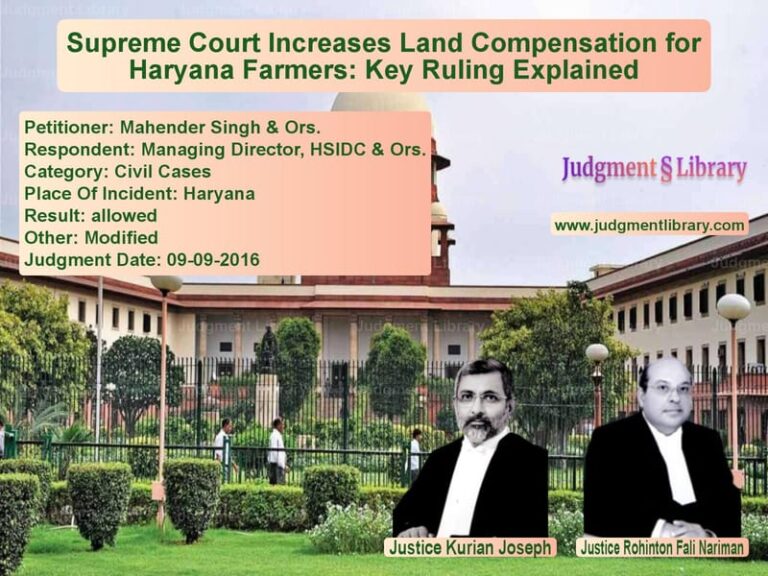Supreme Court Refers Arbitration Seat vs Venue Issue to Larger Bench in Union of India v. Hardy Exploration
The case of Union of India v. Hardy Exploration and Production (India) INC revolves around a critical legal question in international commercial arbitration: Does the designation of a ‘venue’ for arbitration automatically establish the ‘seat’? The Supreme Court of India, in its judgment, referred this significant issue to a larger bench for definitive clarification.
Background of the Case
The dispute arose between Union of India (appellant) and Hardy Exploration and Production (India) INC (respondent) regarding an arbitration award delivered under an international commercial arbitration agreement. The appellant, Union of India, challenged the award under Section 34 of the Arbitration and Conciliation Act, 1996, arguing that Indian courts had jurisdiction over the matter. However, Hardy Exploration contended that Indian courts lacked jurisdiction as the arbitration was seated outside India.
The case thus brought into focus the fundamental distinction between the ‘seat’ and ‘venue’ of arbitration, a recurring issue in Indian arbitration jurisprudence.
Key Legal Issues
The Supreme Court was tasked with resolving the following key issues:
- Does the mention of a venue in an arbitration agreement automatically determine the seat of arbitration?
- Can Indian courts assume jurisdiction over an arbitration award if the seat of arbitration is not explicitly mentioned?
- What is the legal significance of the arbitration agreement’s terms in determining jurisdiction?
- How should Indian courts interpret precedents from international jurisdictions in determining arbitration seats?
Arguments by the Union of India
The Union of India, represented by Additional Solicitor General Tushar Mehta, put forth the following arguments:
- The arbitration agreement specified a venue but did not explicitly define the seat.
- In the absence of an explicitly designated seat, Indian courts should have jurisdiction under Section 34 of the Arbitration Act to set aside the award.
- Indian and international precedents supported the view that the venue could, in certain circumstances, be treated as the seat.
- The arbitration proceedings had a significant nexus with India, thereby warranting the intervention of Indian courts.
Arguments by Hardy Exploration
Hardy Exploration, represented by Senior Advocate Dr. Abhishek Manu Singhvi, countered these arguments with the following points:
- The arbitration took place under international arbitration rules, rendering Indian courts ineligible to hear a challenge under Section 34.
- The seat of arbitration was in a foreign jurisdiction, meaning Indian courts had no jurisdiction to set aside the award.
- The venue was merely the location of arbitration hearings and did not equate to the seat.
- Previous judicial precedents had established that the seat must be expressly designated and not inferred from the venue.
Supreme Court’s Analysis
The Supreme Court extensively analyzed domestic and international jurisprudence to resolve the question of venue vs. seat. Key precedents cited included:
- Shashoua v. Sharma (2009) EWHC 957 (UK High Court)
- Enercon (India) Ltd. v. Enercon GmbH (2014) 5 SCC 1 (India)
- Videocon Industries Ltd. v. Union of India (2011) 6 SCC 161 (India)
- Sumitomo Heavy Industries Ltd. v. ONGC (1998) 1 SCC 305 (India)
- Naviera Amazonica Peruana SA v. Compania Internacional De Seguros Del Peru (1988) 1 Lloyd’s Law Rep 116 (UK)
After a detailed examination, the Supreme Court made the following observations:
1. The seat of arbitration determines the curial law
The Court reiterated that the seat of arbitration determines the legal framework governing arbitration proceedings and that the jurisdiction of courts over an award depends on the designated seat.
2. Venue alone does not establish jurisdiction
Quoting Shashoua v. Sharma, the Court noted that a mere mention of the venue does not automatically translate into the seat unless other factors support this inference.
3. Indian courts must adopt a consistent approach
The Court noted inconsistencies in Indian rulings on seat determination and underscored the need for a larger bench to provide definitive guidance.
Referral to a Larger Bench
Given the complexity and significance of the issue, the Supreme Court exercised its powers under Order VI Rule 2 of the Supreme Court Rules, 2013, and referred the matter to a larger bench. The Court stated:
“Since this case raises fundamental questions about the interpretation of arbitration agreements, the distinction between venue and seat, and the jurisdiction of Indian courts in international arbitration, it is fit to be decided by a larger bench.”
Implications of the Judgment
The referral of this case to a larger bench has significant implications:
- Clarity in Indian arbitration law: The larger bench’s decision will provide crucial guidance on whether the venue can be treated as the seat in arbitration agreements.
- Impact on international commercial arbitration: The ruling will affect how international parties draft arbitration agreements involving Indian entities.
- Jurisdiction of Indian courts: The case will clarify when Indian courts can set aside arbitral awards in international disputes.
- Interpretation of arbitration clauses: The ruling will serve as a reference point for interpreting ambiguous arbitration agreements.
Conclusion
The Supreme Court’s referral of this case to a larger bench underscores the importance of judicial clarity in international arbitration. By addressing the distinction between seat and venue, the ruling will shape the future of arbitration law in India and beyond. Until the larger bench pronounces its verdict, parties involved in international arbitration should exercise caution in drafting agreements to avoid jurisdictional disputes.
Petitioner Name: Union of India.Respondent Name: Hardy Exploration and Production (India) INC.Judgment By: Justice R.K. Agrawal, Justice Abhay Manohar Sapre.Place Of Incident: International Arbitration.Judgment Date: 01-05-2018.
Don’t miss out on the full details! Download the complete judgment in PDF format below and gain valuable insights instantly!
Download Judgment: Union of India vs Hardy Exploration an Supreme Court of India Judgment Dated 01-05-2018.pdf
Direct Downlaod Judgment: Direct downlaod this Judgment
See all petitions in Arbitration Act
See all petitions in International Arbitration
See all petitions in Commercial Arbitration
See all petitions in Judgment by R K Agrawal
See all petitions in Judgment by Abhay Manohar Sapre
See all petitions in partially allowed
See all petitions in Referred to Larger Bench
See all petitions in supreme court of India judgments May 2018
See all petitions in 2018 judgments
See all posts in Arbitration and Alternate Dispute Resolution Category
See all allowed petitions in Arbitration and Alternate Dispute Resolution Category
See all Dismissed petitions in Arbitration and Alternate Dispute Resolution Category
See all partially allowed petitions in Arbitration and Alternate Dispute Resolution Category







